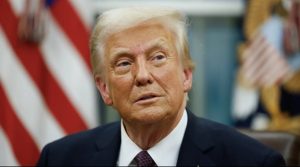President Donald Trump announced on March 6 that he has postponed a planned 25% tariff on most Mexican goods for a month following a conversation with Mexican President Claudia Sheinbaum. The decision, Trump said, was made “out of respect” for Sheinbaum and in recognition of Mexico’s recent efforts to combat illegal migration and drug trafficking.
In a statement, Sheinbaum described the discussion as “excellent and respectful,” emphasizing the progress made in bilateral cooperation. “We agreed that our work and collaboration have yielded unprecedented results, within the framework of respect for our sovereignties. We will continue working together, particularly on issues of migration and security, including the reduction of illegal fentanyl crossings into the United States, as well as arms trafficking into Mexico,” she said.
Trump echoed the sentiment, praising Mexico’s efforts at the border. “Our relationship has been a very good one, and we are working hard, together, on the Border, both in terms of stopping illegal aliens from entering the United States and, likewise, stopping fentanyl,” he wrote on social media. He also confirmed that Mexico would not be required to pay tariffs on goods covered under the United States-Mexico-Canada Agreement (USMCA), but noted that the exemption is in effect only until April 2, when the U.S. will announce new reciprocal tariffs for all countries.
The Mexican government has taken steps in recent weeks to intensify its crackdown on cartels, deploying troops to the U.S. border and extraditing 29 high-profile cartel leaders to the United States.
The White House previously announced a one-month tariff delay for automakers whose vehicles comply with USMCA regulations. Financial executive Howard Lutnick suggested that exemptions for industries beyond car manufacturing are also under consideration.
Meanwhile, Canadian Prime Minister Justin Trudeau stated that his administration is in talks to delay a second round of retaliatory tariffs against the U.S., but reaffirmed Canada’s goal of securing the removal of all tariffs. Trump reportedly told Trudeau in a recent conversation that Canada’s efforts to curb the flow of fentanyl were “not good enough.”
Prime Minister Trudeau held a virtual meeting today with Canada’s premiers to address the United States’ recent tariffs on Canadian goods. The discussion, which included Minister of Finance and Intergovernmental Affairs Dominic LeBlanc, Canada’s Ambassador to the U.S. Kirsten Hillman, and Canada’s Fentanyl Czar Kevin Brosseau, focused on the economic impact of the tariffs and Canada’s response. The Prime Minister and premiers criticized the tariffs as unjustified and reaffirmed their commitment to defending Canada’s economic interests. They emphasized that trade between Canada and the U.S. has long been mutually beneficial and warned that the tariffs could disrupt both economies, putting jobs and affordability at risk.
In response to the U.S. tariffs, Canada is implementing a countermeasure, starting with 25% tariffs on $30 billion worth of U.S. imports, with the potential to expand to $155 billion if the U.S. maintains or increases its tariffs. Trudeau stated that Canada’s response aims to minimize harm to Canadian businesses and workers while addressing the economic challenge posed by the tariffs. Minister LeBlanc announced that the federal government will introduce a support package to assist affected Canadian workers, families, and industries. The meeting also covered efforts to reduce internal trade barriers within Canada. First Ministers pledged to continue working together to protect Canada’s economy and sovereignty in the face of ongoing trade tensions.
China has adopted a defiant stance, with officials declaring they are ready to confront the U.S. in “any type of war.”



